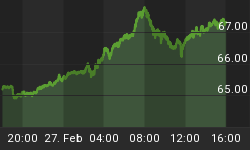Dow Jones Industrial Average 10,005
Value Line Arithmetic Index 1588
30-Year Treasury Index 4.90%
The Big Picture for Stocks
The 2002-2004 bull market is probably over.
Technical Trendicator (1-4 month trend):
Stock Prices Down
Bond Prices Down
I remain negative on the broad market. I suspect that the cyclical bull market that began in 2002 ended this year, and the market will trend down into 2006. In addition to this 4-year cycle, we are in a longer term secular bear market. Secular bear markets tend to last around 15 years, and are occasionally interrupted by shorter cyclical bull markets. For example, the last secular bear in the U.S. lasted from 1966 till 1982, but there were four cyclical bull markets that ran counter to the major downward trend. Yet the Dow Jones Industrials was as low as 585 in 1982 after being as high as 1000 in 1966! Another example of a secular bear market is Japan, began a long secular bear market in 1989.
Our current secular bear began in 2000, and was interrupted by a nice cyclical bull market from 2002 to 2004. There is no good reason to think that it won't be of similar duration as other secular bear market periods. So, the way I see it right now, all trends are down - secular, cyclical, and short/intermediate (Technical Trendicator).
Some industry groups look particularly worrisome to me. Here are some thoughts that reflect my concerns:
-
Retailing. The consumer is tremendously overleveraged and the risk to the retailing sector is large. A long and protracted period of weakness in this sector is a strong possibility. See the chart below, compliments of ContraryInvestor.com.
-
Largecap biotech. We have gotten so accustomed to the idea that science can produce drugs to solve any problem. The Vioxx problem is an indication that this may be an illusion. The big biotech and drug stocks are at risk.
-
Media. The traditional media no longer holds monopoly power. Yet these stocks are still priced as if they do.
-
Internet. The internet glamour stocks sport huge multiples of 60 to 90. They may not grow at rates that justify these multiples. Advertising rates could wane in a recession. While many of these companies have developed franchise names, increased competition is not out of the question. Cycles dictate that as soon as a company seems unbeatable and gets cocky, something happens to knock it down.
-
Utilities and REIT's. I may be wrong, but I sense that investors have bid these stocks up to unreasonable prices in order to buy dividends. These industries are also vulnerable to terrorist attacks.
-
Financials. We have too many banks, insurance companies, and stock brokerage firms. There is too much competition which will become evident in the next few years. The investing public has not made any money in stocks in several years, and they will soon give up on stocks and put their money in fixed income, which is less profitable to investment firms. Also, there is an increasing chance of a disaster because of too much leverage or derivatives. And when the mortgage origination boom stops, it will put a pall over at least part of this industry.
-
Homebuilders. The boom will not last forever and when it stops, these companies suffer severely. The bears have been so wrong for so long (including yours truly) that they are at the point of numbness, which may suggest a top.

Stock Selection
We were stopped out of our short sales in KBH and BBH. These liquidations lowered our average annualized return on closed positions in our Special Situations list to 251%.
Given the above comments about the financial industry, I am putting an Exchange Traded Fund on the Special Situations list as a short sale. Sell short the Financial Select Sector SPDR (XLF) at the market.
Even though I am negative on the broad market, there are opportunities on the long side. I am adding two stocks to the buy list. Both stocks are speculative bulletin board stocks, but have big upside potential:
-
Global Axcess Corp. (GLXS). This company is a classic example of consolidation in a fragmented industry. They own ATM machines. They are able to buy out small operators in this industry at about 3 times EBITDA. Read the merger announcements on September 30 and October 5: http://finance.yahoo.com/q?s=GLXS.OB. Don't pay more than 33 cents per share for the stock.
-
Bulldog Technologies (BLLD). If you listened to the Presidential debate on October 8, you heard that containers are not adequately protected against terrorism. Bulldog has a multifaceted product that provides security for containers. This company is just coming out of the development stage. Do your own reading about it: http://finance.yahoo.com/q?s=BLLD.OB. Place limit orders at 2.40 or below.
Regards,















